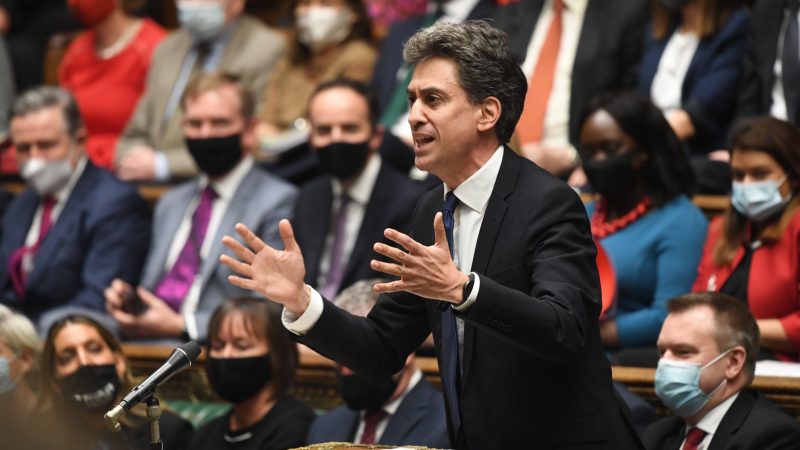
Ed Miliband has argued that the warning that households could experience three-hour power cuts this winter “shows our vulnerability as a country as a direct consequence of a decade of failed Conservative energy policy”.
Commenting after the National Grid published scenarios that could occur this winter, as it assessed a highly uncertain period for power supplies amid the fallout from Russia’s invasion of Ukraine, the Shadow Climate Change and Net Zero Secretary said it is “the government’s responsibility to ensure the UK is resilient”.
The National Grid warned that people could have their electricity cut off for three hours at a time if there is not enough gas to supply power plants this winter if Russia cuts off gas supplies and Britain experiences a cold snap, forcing emergency plans for scheduled disconnections of customers to be put into action.
Miliband said that “banning onshore wind, slashing investment in energy efficiency, stalling nuclear and closing gas storage have led to higher bills and reliance on gas imports” had left the UK “more exposed to the impact of Putin’s use of energy as a geopolitical weapon”.
He added: “Yet still the Conservatives fail to learn the lessons. This government has already crashed the economy with their kamikaze budget, and a humiliating U-turn they were forced into which came too late. The damage has been done, and now we are all suffering the consequences.
“It is the government’s responsibility to ensure the UK is resilient, but instead they have left the UK’s key infrastructure dangerously exposed. The Prime Minister must meet with the National Grid as a matter of urgency and set out a plan.
“Only Labour can deliver lower energy bills and energy security for the UK, with our plans for clean power by 2030 and to launch GB Energy, a publicly-owned, clean energy company, to make Britain an energy independent superpower.”
Keir Starmer used his speech to Labour’s annual conference last month to announce that his party would create a publicly owned energy company. The opposition leader said its role would be to provide “additional capacity” alongside establishing the UK as a “clean energy superpower” and guaranteeing “long term energy security”.
The National Grid has been working on a series of measures to attempt to boost supply and manage demand this winter including preparing to bring back into action five coal-fired power plants, which can generate up to two gigawatts of power, after signing deals with Drax, EDF and Uniper at a cost of £340m to £395m.
The body will also launched the “demand flexibility service” on November 1st, through which it will encourage businesses and consumers to use power outside peak demand periods, including early evenings on weekdays.
Consumers with smart meters will be notified the day before and paid for using power outside peak time periods through the scheme in a move the National Grid hopes will free up an extra 2GW, or enough to power around 600,000 homes.
The network operator has insisted that it is “cautiously confident” that there will be enough electricity to meet demand over the winter months. In its “base case”, the National Grid predicted “sufficient operational surplus”, estimating that there will be around 3.7GW more of electricity generated than the country will use.
The National Grid outlined two further scenarios, however, that could be triggered by Russia cutting off supply or or outages in another country’s generation fleet.
In the first scenario, electricity imports from France, Belgium and the Netherlands would be cut off for the whole winter and the coal-fired stations would be brought online and the ‘demand flexibility service’ triggered.
A more serious scenario accounted for a shortage of gas that would knock out around 10GW of gas-fired power generation and trigger “temporary rota load shedding” where consumers are disconnected.




More from LabourList
‘The hope that kills you’: Reflections from the final day in Gorton and Denton
MPs, union leaders and organisations react to ‘bruising’ Gorton and Denton result
A gory night for Labour